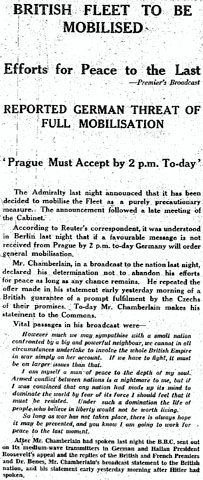
The German ultimatum for the Czech withdrawal from the Sudetenland by 1 October remains. But there is a report of a new deadline: the ultimatum must be accepted by 2pm today, or else Germany will mobilise its armed forces (Manchester Guardian, p. 9). Hungary has already begun mobilising, and the Royal Navy has been given its orders this morning. It seems probable that war will start any day now — maybe tomorrow, if no way to peace can be found.
A speech by Chamberlain was broadcast by the BBC last night. He repeated his pledge to Hitler to make sure the Czechs keep their promise to hand over the Sudetenland (i.e. at a time to be decided, not by Saturday). He can’t take the Empire into war just to save one nation, there would have to be more important issues at stake.
How horrible, fantastic, incredible it is that we should be digging trenches and trying on gas masks here because of a quarrel in a far-away country between people of whom we know nothing.
(You can hear the whole speech here, found here.) The leader-writer for the Manchester Guardian (p. 8) sees this as ‘an ungenerous reference to a gallant State that has made enormous sacrifices for peace’. In fact, the whole speech is deemed to be directed more at Hitler than at the British people, who won’t find it much in sympathy with their views. For example, Hitler is merely described as ‘unreasonable’, ‘a phrase that may become classical for its understatement’.
Two-thirds of the population now have their gas masks or have been fitted for one, according to the Daily Mail (p. 3). A gas-proof kennel has been developed for pets (p. 7), and the Home Office says they’ve finally got a means of gas-protection for babies in production (The Times, p. 12). Plans are being made for the evacuation of schoolchildren from London. This will not be compulsory, but if parents give their consent their children will be evacuated with their school. Some public schools, orphanages and ‘schools for physical defectives’ have already been evacuated (p. 15). The government is ready for food rationing: 50 million ration cards and 18 million application forms (one for every household) have been printed. The police have issued black-out instructions for houses and motor-vehicles. Trench-digging, of course, is proceeding as fast as possible, in many places continuing through the night.
In quiet Lincoln’s Inn Fields, for example, trenches were being dug, and during the luncheon hour huge crowds of office workers were inspecting them, many, no doubt, with the Home Office plan for protective trenches in private gardens in their minds, wanting to see how experts constructed these splinter-proof shelters.
The imminence of war is altering behaviour and creating new problems. There’s been a run on petrol in London’s suburbs, as car-owners fill up their tanks in anticipation of rationing (p. 7). Though it also has to do with
the increase in the volume of traffic on the arterial roads, caused by the fact that many men are taking their wives and families to live in the country.
The Postmaster-General has appealed to telephone subscribers to limit their non-essential conversations as much as possible. These are causing unusually heavy demands on trunk and local telephone systems, leading to delays for essential calls (p. 10). The BBC has warned the public to ignore rumours, such as the one that ‘normal railway services are to close down on Friday night’ (p. 10). And instances of ARP profiteering have emerged: in one case, a local official in Essex was placing a telephone order, turned away for a moment, and then when he returned to the call was told that the price for whatever it was that he was ordering had gone up by £3 per ton (Manchester Guardian, p. 3)!
Speaking of which, here are some advertisements which use the crisis as their selling point: From the Manchester Guardian (p. 7), Cephos cold and headache remedy:
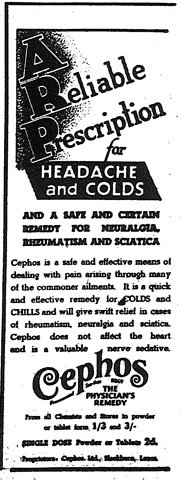
From the same newspaper (p. 10), British Cellophane (i.e. to gas-proof windows and protect against flying glass shards):
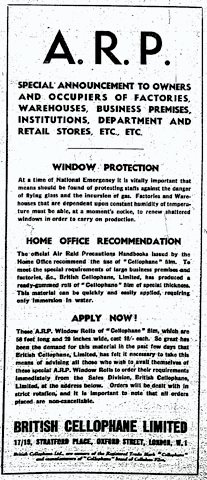
And from the Daily Mail, Zylex, for lining your garden trench shelter (p. 3):

I haven’t been able to pay much attention to the letters columns for a while, because there is just too much else going on. Rest assured that they have been busy. Here’s one I can’t resist noting, because it’s by a man named Fleming — Ian Fleming.1 It’s a long letter, in The Times (p. 12); in it he argues for the appeasement of Hitler on the basis of the relevant parts of the Nazi Party’s original 25-point programme issued in February 1920. Essentially this boils down to (1) the union of all German-speaking peoples; (2) the equality of Germany with respect to other nations; and (3) colonies for food and emigration. Fleming sees these principles as consistent with Hitler’s recent actions, and so Britain should treat his demands as sincere. And since appeasing Germany is the only way to peace, this is what should be attempted. But he adds that:
If and when Herr Hitler refuses a settlement on these lines — if, that is to say, it is made clear that Germany already aims once again at world domination by aggression — then it will be time to organize this country on a wartime basis and announce to Germany that we shall fight at the first act of aggression against our fundamental treaty obligations.
Although in his closing sentence he seems to hold out neutrality as another option:
[…] then it will be time to turn a reluctant ear either to the dangerous counsels of the slaughter-house brigade or to the bemused vapourings of those who long for the day when England is another Holland and out of the fight forever.
Not an atypical sentiment in Britain in late September 1938, I’d say, although his familiarity with early Nazi policy is rather more unusual!
![]() This work is licensed under a Creative Commons Attribution-NonCommercial-NoDerivatives 4.0 International License.
Permissions beyond the scope of this license may be available at http://airminded.org/copyright/.
This work is licensed under a Creative Commons Attribution-NonCommercial-NoDerivatives 4.0 International License.
Permissions beyond the scope of this license may be available at http://airminded.org/copyright/.


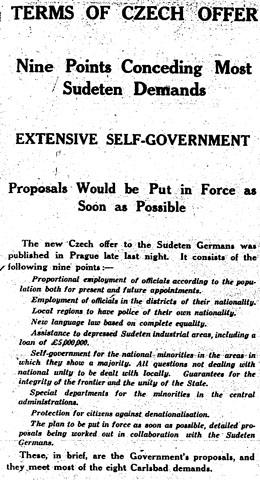
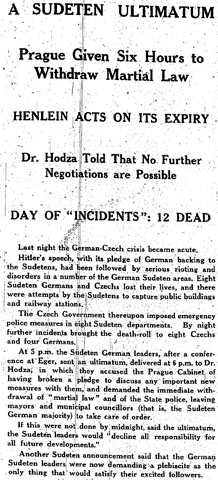
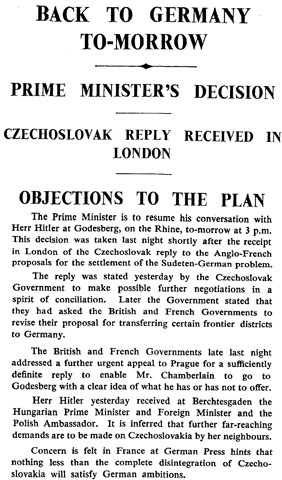
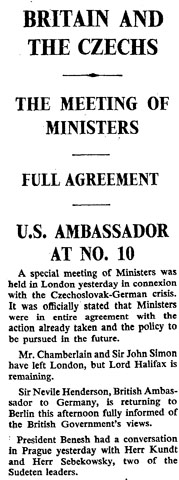
Wow! That Hitler guy can’t back down now. He’d look like an idiot!
Yeah, I’d like to see how he gets himself out of this one.